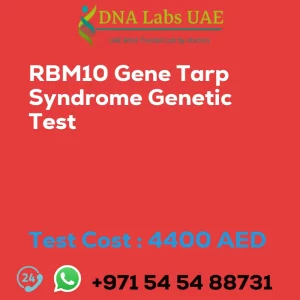Genetic Lab Blog: IFT172 Gene Short-rib thoracic dysplasia type 10 with or without polydactyly Genetic Test
Genetic testing plays a crucial role in diagnosing and understanding rare genetic disorders. In this blog, we will discuss the IFT172 Gene Short-rib thoracic dysplasia type 10 with or without polydactyly Genetic Test offered by DNA Labs UAE.
Test Details
The IFT172 gene is associated with a rare genetic disorder known as short-rib thoracic dysplasia type 10 with or without polydactyly. This disorder primarily affects the skeletal system, particularly the ribs and long bones. It is also characterized by the presence of extra fingers or toes, a condition called polydactyly.
The IFT172 Gene Short-rib thoracic dysplasia type 10 with or without polydactyly Genetic Test offered by DNA Labs UAE utilizes NGS (Next-Generation Sequencing) technology. This advanced method allows for the analysis of the IFT172 gene to identify any mutations or variations that may be present.
By sequencing the DNA in the IFT172 gene, this genetic test can help confirm a diagnosis of short-rib thoracic dysplasia type 10 with or without polydactyly. Additionally, it provides valuable information about the specific mutation(s) present, which can be useful for genetic counseling and family planning.
Test Components and Price
The cost of the IFT172 Gene Short-rib thoracic dysplasia type 10 with or without polydactyly Genetic Test is AED 4400.0. The test requires a sample condition of blood, extracted DNA, or one drop of blood on an FTA Card.
Report Delivery and Method
After the sample is collected, the report delivery time for this genetic test is approximately 3 to 4 weeks. The method used for the test is NGS (Next-Generation Sequencing) technology.
Test Type, Doctor, and Test Department
The IFT172 Gene Short-rib thoracic dysplasia type 10 with or without polydactyly Genetic Test falls under the category of dysmorphology tests. It is recommended to consult with a pediatrician for this specific test. The test department responsible for conducting this genetic test is the Genetics department.
Pre Test Information
Prior to undergoing the IFT172 Gene Short-rib thoracic dysplasia type 10 with or without polydactyly NGS Genetic DNA Test, it is essential to provide the clinical history of the patient. This includes information about the patient’s symptoms and any relevant medical history.
A genetic counseling session is also recommended to draw a pedigree chart of family members affected by the IFT172 Gene Short-rib thoracic dysplasia type 10 with or without polydactyly NGS Genetic DNA Test gene IFT172. This session helps in understanding the inheritance pattern and identifying potential carriers of the disorder.
It is important to note that genetic testing should always be conducted by a qualified healthcare professional or genetic counselor. They possess the expertise to interpret the test results accurately and provide appropriate guidance and support.
| Test Name | IFT172 Gene Short-rib thoracic dysplasia type 10 with or without polydactyly Genetic Test |
|---|---|
| Components | |
| Price | 4400.0 AED |
| Sample Condition | Blood or Extracted DNA or One drop Blood on FTA Card |
| Report Delivery | 3 to 4 Weeks |
| Method | NGS Technology |
| Test type | Dysmorphology |
| Doctor | Pediatrics |
| Test Department: | Genetics |
| Pre Test Information | Clinical History of Patient who is going for IFT172 Gene Short-rib thoracic dysplasia type 10 with or without polydactyly NGS Genetic DNA Test. A Genetic Counselling session to draw a pedigree chart of family members affected with IFT172 Gene Short-rib thoracic dysplasia type 10 with or without polydactyly NGS Genetic DNA Test gene IFT172 |
| Test Details |
IFT172 gene is associated with a rare genetic disorder called short-rib thoracic dysplasia type 10 with or without polydactyly. This disorder is characterized by skeletal abnormalities, particularly affecting the ribs and long bones, as well as extra fingers or toes (polydactyly). NGS (Next-Generation Sequencing) genetic testing can be used to analyze the IFT172 gene for any mutations or variations that may be present. This test involves sequencing the DNA in the gene to identify any changes that may be causing the disorder. By identifying mutations in the IFT172 gene, NGS genetic testing can help confirm a diagnosis of short-rib thoracic dysplasia type 10 with or without polydactyly. It can also provide information about the specific mutation(s) present, which can be useful for genetic counseling and family planning. It is important to note that genetic testing should be performed by a qualified healthcare professional or genetic counselor who can interpret the results and provide appropriate guidance and support. |








